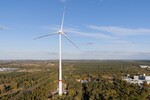News Release from 50Hertz Transmission GmbH
Wind Industry Profile of
50Hertz and Estonian transmission system operator Elering to build submarine cable between Estonia and Germany
While attending the Baltic Offshore Wind Forum at the German Federal Foreign Ministry in Berlin today, the German Transmission System Operator (TSO) 50Hertz and its counterparts from Estonia, Latvia and Lithuania agreed to intensify their cooperation. In another Letter of Intent (LoI), 50Hertz and Elering (Estonia) agreed on a joint hybrid submarine cable project called Baltic WindConnector in the Baltic Sea between Estonia and Germany.
The declarations were signed by CEOs Stefan Kapferer (50Hertz), Taavi Veskimägi (Elering, Estonia), Gunta Jekabsone (AST, Latvia) and Tomas Varneckas (Litgrid, Lithuania) in the presence of State Secretary Liga Kurevska (Minstry of Climate and Energy, Latvia), Parliamentary State Secretary Stefan Wenzel (Federal Ministry of Economy and Climate Protection, Germany), Timo Tatar, Deputy Secretary General for Energy and Mineral Resources (Ministry of Economic Affairs and Communications, Estonia) and Tomas Irnius, Head of Baltic Sea States Division (Ministry of Foreign Affairs, Lithuania).
Stefan Kapferer, CEO of 50Hertz: "The Baltic Sea still offers a lot of potential for the expansion of offshore wind energy and therefore for cross-border projects to develop this potential as efficiently as possible via hybrid interconnectors or energy islands. Cooperation with the Baltic states and their stronger connection to the continental European electricity system is important for a climate-neutral Europe and also of great significance in terms of security policy. The Baltic WindConnector should be a first important step on this path.
Taavi Veskimägi, Chairman of the board of Elering: "Estonia has significantly more resources for the development of offshore wind farms than is needed to ensure our own security of supply. The analyzes will show us whether the electricity connection with Germany, as a large consumption center, will allow us to increase the export potential here without spending the Estonian consumer's money."
Stefan Wenzel, Parliamentary State Secretary at the Federal Ministry of Economics and Climate Protection (BMWK): "Reliable imports of renewable electricity and green hydrogen from the North and Baltic Sea region are developing into a relevant building block for the German energy transition and can make a decisive contribution to Europe's independence from fossil fuels. In the next 10 years, the aim is to develop concrete projects for renewable electricity and green hydrogen with our partner countries such as the Baltic States and to exploit synergy effects. With the multilateral declaration of the Baltic Offshore Wind Forum and the memorandum of understanding signed today by the Transmission System Operators, important steps have been taken to jointly develop offshore wind energy in the Baltic Sea region."
The Baltic WindConnector will be around 750 kilometres long and will land on the coast of Mecklenburg-Western Pomerania. In addition to the utilisation of green power potential through the connection of future large offshore wind farms off the Estonian Baltic Sea coast, both countries and central Europe will benefit from an increase in security of supply. At the same time, Estonia has the chance to become an exporting country of green electricity for the European electricity market. The advantage for Germany is to diversify its sources of green electricity in order to achieve climate neutrality by 2045 and to almost completely decarbonise its industry.
With a hybrid interconnector, wind farms feed their electricity into a transmission system that can also be used for European electricity trading. It therefore fulfils a dual function. This requires the construction of one or more converter plants off the coast of Estonia, where the electricity can be accumulated, wound up to a higher voltage level, converted to direct current and then transported to the connected countries according to demand.
Further cooperations planned with all three Baltic TSOs
The second LoI with all three Baltic TSOs aims to facilitate cooperation in the offshore sector in various constellations. Behind this is the vision of realising so-called "meshed offshore grids" off the coasts of Lithuania and Latvia, through which electricity can be brought onshore efficiently and in line with market requirements. 50Hertz is a pioneer in this field and is already working closely with the Danish grid operator Energinet in the Baltic Sea. Together, the companies operate the hybrid interconnector Combined Grid Solution - Kriegers Flak. 50Hertz and Energinet also want to develop the Bornholm Energy Island project, an electricity hub on the Baltic Sea island of Bornholm, through which wind power will flow to Germany and Denmark according to demand.
At the Baltic Offshore Wind Forum today, around 200 guests from Germany and abroad discussed the potential of the Baltic Sea region for energy production and thus for climate protection. The event was organised jointly by the German Federal Foreign Ministry, the Danish Ministry for Foreign Affairs and the German Energy Agency (dena).
- Source:
- 50Hertz
- Author:
- Press Office
- Link:
- www.50hertz.com/...
- Keywords:
- Germany, Lithuania, Estonia, Latvia, offshore, grid, operator, submarine cable, energy security, 50Hertz, Baltic Sea
























